Finding economic data on Passport
10/02/2022

One of the quickest and easiest ways to find global economic statistical data from a range of authoritative sources is to use Passport. Passport, a Euromonitor product, has both quarterly and annual historical data going back in some cases to 1977 and also provides several years’ worth of forecasts for some economic indicators e.g. GDP, inflation, population, foreign direct investment to name but a few. Information is obtained from national statistics offices, governmental and official sources.
Macroeconomic data is most easily accessed via the ‘Economies’ option on the Passport top menu bar.
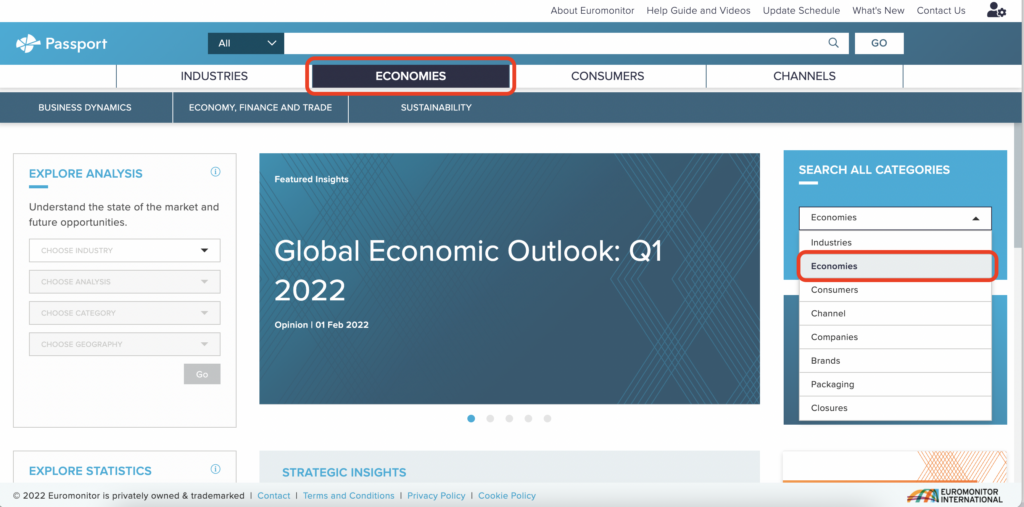
From the Economies dashboard, find the ‘Search all categories’ menu (highlighted above) and select ‘Economies’ from the dropdown list. This will take you to the Euromonitor ‘category tree’ where you can either search for or browse to the data you require.
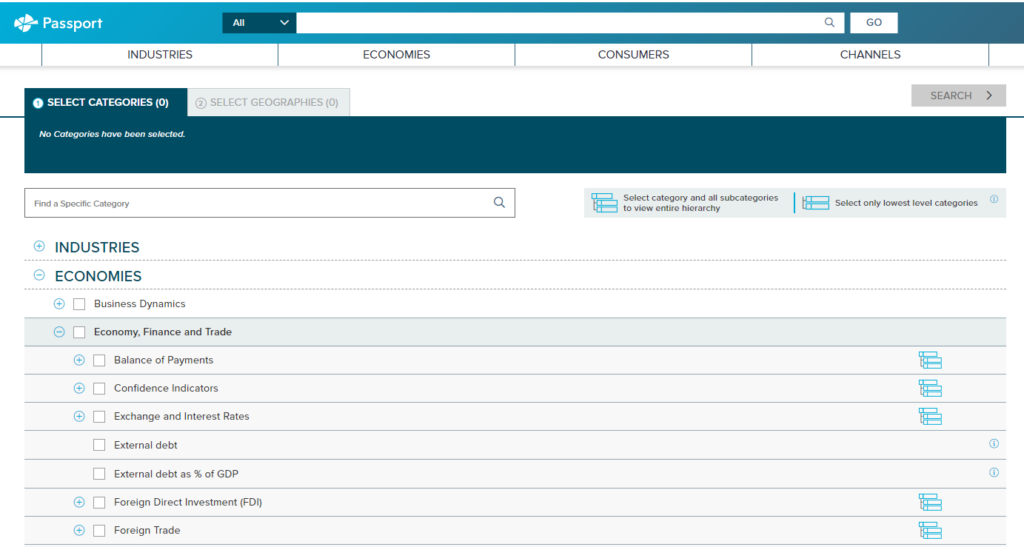
Within the Category Tree, you can drill down within data categories for more specific datasets. Any heading with a blue ‘+’ icon next to it has further subcategories to explore. (These are definitely worth exploring). Click on the ‘+’ to open these.
Select the category or categories you require using the check-boxes and click on ‘Next’ (at the bottom right) to choose your country or countries in the same fashion. Drill down as far as you can before checking any boxes – this will ensure you get the level of data you require.
Once you have completed your options, click on ‘Next’ and select your countries in a similar fashion. Choose from individual countries or select a pre-defined group, such as MINT, from the ‘Geographies’ dropdown menu on the right.
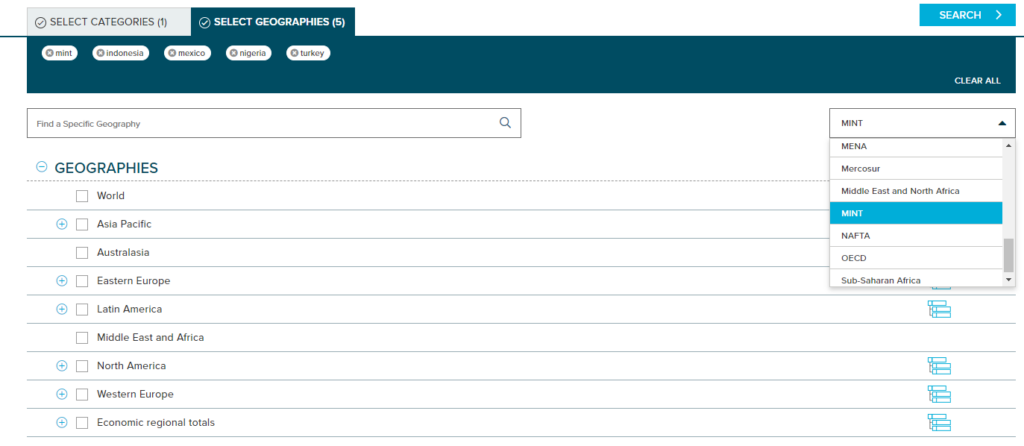
Once you have added all your countries, click on ‘Search’ to run the search. As always Passport displays results under two tabs. You will find data in the left-hand tab, under ‘Statistics’.
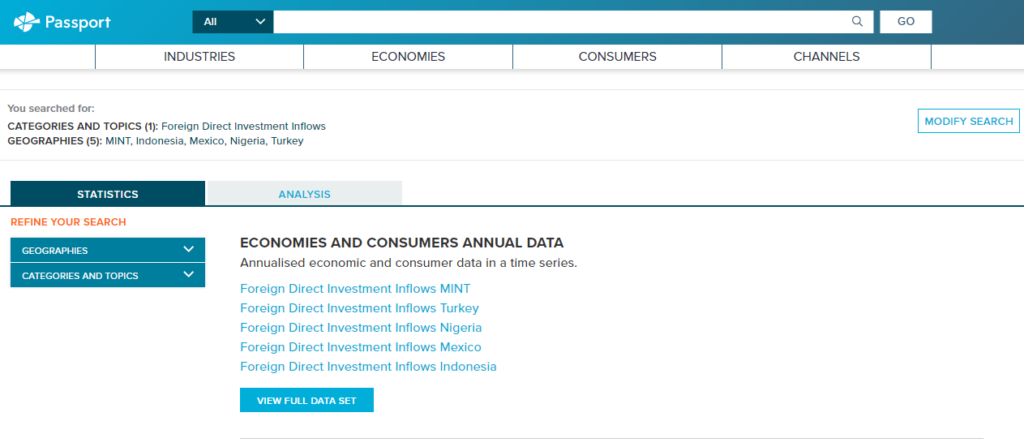
Click on any option to view an individual dataset – or on ‘View Full Data Set’.
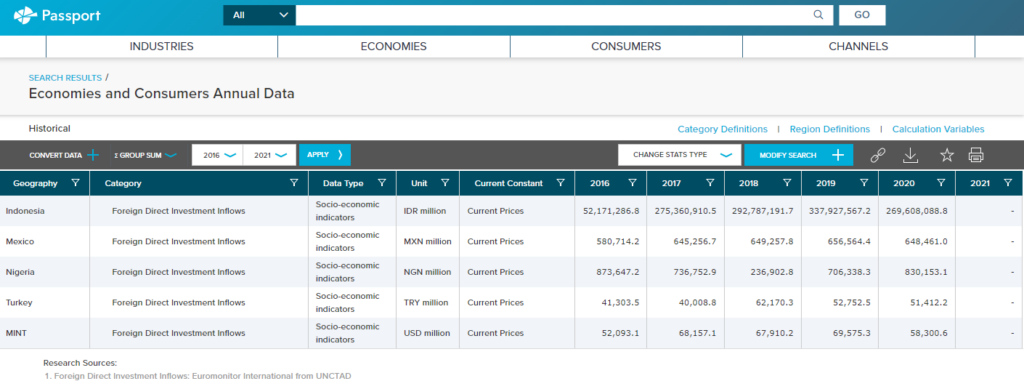
- Use ‘Convert Data’ to select currency displayed and other options.
- Amend your date range using the dropdown menus.
- Use the download option to export to Excel or PDF.
Macroeconomic data is also easily accessible via FitchConnect. Find out more here.
If you have any questions about data and where to find it, contact the Library Service for advice.
Feature image from Pixabay. Available at: https://pixabay.com/photos/earth-internet-globalisation-2254769/
Categories & Tags:
Leave a comment on this post:
You might also like…
Keren Tuv: My Cranfield experience studying Renewable Energy
Hello, my name is Keren, I am from London, UK, and I am studying Renewable Energy MSc. My journey to discovering Cranfield University began when I first decided to return to academia to pursue ...
3D Metal Manufacturing in space: A look into the future
David Rico Sierra, Research Fellow in Additive Manufacturing, was recently involved in an exciting project to manufacture parts using 3D printers in space. Here he reflects on his time working with Airbus in Toulouse… ...
A Legacy of Courage: From India to Britain, Three Generations Find Their Home
My story begins with my grandfather, who plucked up the courage to travel aboard at the age of 22 and start a new life in the UK. I don’t think he would have thought that ...
Cranfield to JLR: mastering mechatronics for a dream career
My name is Jerin Tom, and in 2023 I graduated from Cranfield with an MSc in Automotive Mechatronics. Originally from India, I've always been fascinated by the world of automobiles. Why Cranfield and the ...
Bringing the vision of advanced air mobility closer to reality
Experts at Cranfield University led by Professor Antonios Tsourdos, Head of the Autonomous and Cyber-Physical Systems Centre, are part of the Air Mobility Ecosystem Consortium (AMEC), which aims to demonstrate the commercial and operational ...
Using grey literature in your research: A short guide
As you research and write your thesis, you might come across, or be looking for, ‘grey literature’. This is quite simply material that is either unpublished, or published but not in a commercial form. Types ...






